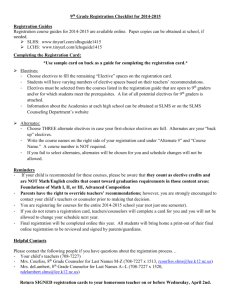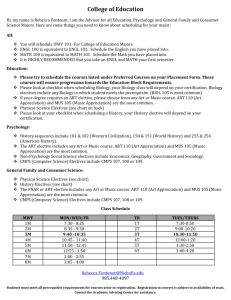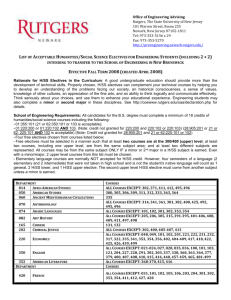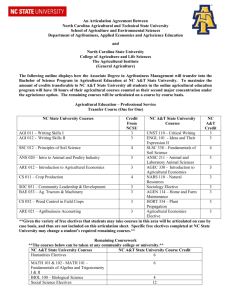Agriculture Stage 6 Syllabus Amendments
advertisement
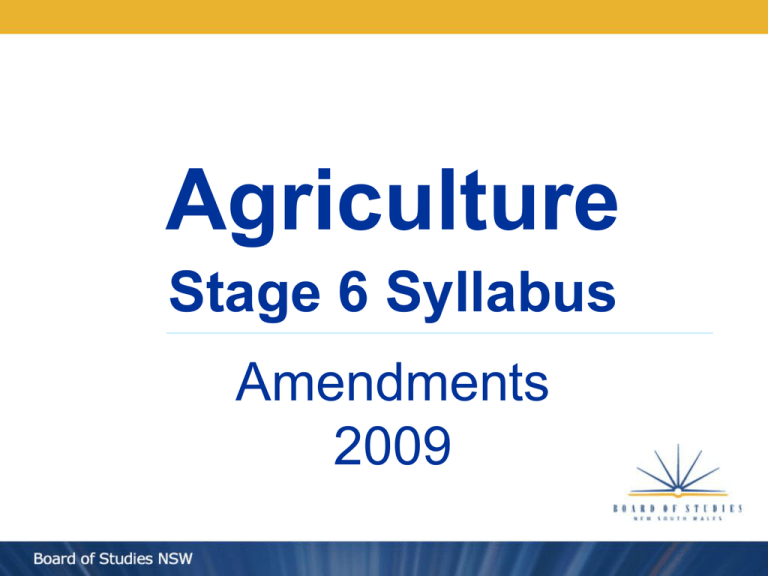
Agriculture Stage 6 Syllabus Amendments 2009 Preliminary course No changes to the Preliminary course structure Minor amendments to clarify course content and depth of study Outcomes P3.1 and P5.1 have been modified to strengthen the breadth and depth of the outcomes HSC course structure Core (80%) (approximately 96 indicative hours) HSC course changes Plant/Animal Production (50%) – Soil, nutrients and water – Factors contributing to the degradation of soil and water – Sustainable resource management – Plant production systems – Constraints on plant production – Managing plant production – Animal nutrition – Animal growth and development – Animal reproduction and genetics – Animal pests and diseases – Animal ethics and welfare – Experimental analysis and research in plant/animal systems • the core has been increased from 70% to 80% • elective choices have been reduced from six to three • the number of electives to be studied has been reduced from two to one • the time for study of the elective has increased from 15% to 20% • the Optional Research Project has been removed Farm Product Study (30%) – The farm as a business – Decision-making processes and management strategies – Agricultural technology – Marketing of a specific farm product Elective (20%) (approximately 24 indicative hours) Choose ONE of the following electives to study – Agri-food, Fibre and Fuel Technologies – Climate Challenge – Farming for the 21st Century Outcomes Outcome The verbs in some outcomes have been modified to strengthen the breadth and depth of the outcomes. Current Revised P3.1 describes the role of decisionmaking in the management and marketing of agricultural products in response to consumer and market requirements explains the role of decision-making in the management and marketing of agricultural products in response to consumer and market requirements P5.1 identifies the role of associated technologies and technological innovation in producing and marketing agricultural products investigates the role of associated technologies and technological innovation in producing and marketing agricultural products H4.1 applies appropriate experimental techniques, technologies, research methods and data presentation and analysis in relation to agricultural problems and situations justifies and applies appropriate experimental techniques, technologies, research methods and data presentation and analysis in relation to agricultural problems and situations Amendments have been made to the content statements to make them more contemporary and detailed. Content is represented as ‘learn about’ and ‘learn to’ statements in columns. Content Students learn about: Innovation, ethics and current issues the term ‘biotechnology’, a term used to cover the use of living things in industry, technology, medicine or agriculture Students learn to: define DNA, gene, genetically modified organism (GMO), gene markers, genetic engineering and protein synthesis describe the implications of biotechnology in the agri-foods, fibre and fuel industries outline the importance of food safety and labelling of GMOs Research Opportunities for the study of current research and a focus on a research based process have been provided in each elective. Students learn about: Students learn to: Research methodology and presentation of research analyse a research study of climate ■research into climate variability variability or management strategies in climate variability in terms of: – – – – – – design of the study methodology of the study collection of data for the study presentation of data analysis of the data conclusions and recommendations explain the need for research in climate variability or management for climate variability Overlap Selected content from the previous electives including Plant management, Animal management, Sustainable land and resource management has been incorporated in the Plant and Animal production core. These amendments have reduced the overlap between the core and the electives in the HSC course. Plant management Animal management Core Sustainable land and resource management Electives HSC elective changes: • elective choices have been reduced from six to three • the number of electives to be studied has been reduced from two to one • the time for study of the elective has increased from 15% to 20% Elective (20%) (approximately 24 indicative hours) Choose ONE of the following electives to study – Agri-food, Fibre and Fuel Technologies – Climate Challenge – Farming for the 21st Century



